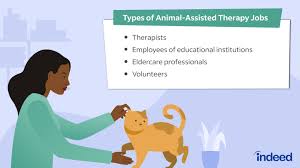The Benefits of Pet Therapy Courses for Animal Lovers
For animal lovers looking to make a positive impact on the lives of both animals and humans, pet therapy courses offer a rewarding and fulfilling opportunity. Pet therapy, also known as animal-assisted therapy, involves using trained animals to help individuals cope with various physical, emotional, and mental health challenges.
Participating in pet therapy courses can provide numerous benefits for both the animals involved and the individuals receiving therapy. Animals have a unique ability to provide comfort, companionship, and unconditional love, which can have a profound impact on improving mood, reducing stress and anxiety, and enhancing overall well-being.
Individuals who undertake pet therapy courses learn valuable skills in animal handling, behaviour assessment, and therapeutic techniques. They gain a deeper understanding of the human-animal bond and how animals can be instrumental in promoting healing and wellness.
Moreover, pet therapy courses can open up opportunities for participants to volunteer at hospitals, nursing homes, schools, rehabilitation centres, and other facilities where animal-assisted therapy is beneficial. By sharing their time and skills with those in need, individuals can make a meaningful difference in the lives of others while experiencing the joy of working closely with animals.
Whether you are a seasoned animal lover or someone looking to explore a new avenue of helping others through the power of animals, pet therapy courses offer a unique and fulfilling path. Embrace the opportunity to make a positive impact on both animals and humans alike through the transformative practice of pet therapy.
6 Essential Tips for Choosing the Right Pet Therapy Course in the UK
- Research reputable institutions that offer pet therapy courses.
- Ensure the courses cover topics such as animal behaviour, human-animal interaction, and therapy techniques.
- Check if the courses provide hands-on experience with animals to enhance learning.
- Verify if the instructors are experienced professionals in the field of pet therapy.
- Consider the duration and flexibility of the courses to fit your schedule and learning pace.
- Look for opportunities for practical training or internships post-course completion.
Research reputable institutions that offer pet therapy courses.
When considering enrolling in pet therapy courses, it is crucial to conduct thorough research on reputable institutions that offer comprehensive and accredited programmes. By choosing institutions with a strong reputation in the field of animal-assisted therapy, individuals can ensure they receive high-quality education and training that will equip them with the necessary skills and knowledge to excel in the practice of pet therapy. Investing time in finding reputable institutions demonstrates a commitment to professionalism and ethical standards in providing effective pet therapy services for both animals and humans.
Ensure the courses cover topics such as animal behaviour, human-animal interaction, and therapy techniques.
To maximise the effectiveness of pet therapy courses, it is crucial to ensure that the curriculum covers essential topics such as animal behaviour, human-animal interaction, and therapy techniques. Understanding animal behaviour is fundamental in establishing a strong foundation for effective communication and training with therapy animals. Learning about human-animal interaction helps participants develop empathy and sensitivity towards both animals and the individuals they are assisting. Additionally, mastering therapy techniques equips individuals with the necessary skills to facilitate healing and emotional support through meaningful interactions with animals. By incorporating these key topics into pet therapy courses, participants can enhance their knowledge and capabilities to make a positive impact in the field of animal-assisted therapy.
Check if the courses provide hands-on experience with animals to enhance learning.
When considering pet therapy courses, it is essential to check if the programmes offer hands-on experience with animals as part of the learning process. Practical interaction with animals not only enhances learning but also provides invaluable real-world experience in handling and working with therapy animals. This hands-on approach allows participants to develop essential skills, deepen their understanding of animal behaviour, and build a strong foundation for effective animal-assisted therapy practice.
Verify if the instructors are experienced professionals in the field of pet therapy.
When considering enrolling in pet therapy courses, it is crucial to verify if the instructors are experienced professionals in the field of pet therapy. Instructors with a wealth of experience bring valuable insights, practical knowledge, and expertise that can significantly enhance your learning journey. Their guidance and mentorship can help you develop the necessary skills and understanding to excel in the practice of pet therapy and make a positive impact on both animals and individuals in need. By ensuring that your instructors are seasoned professionals, you can feel confident in receiving high-quality education and training that will prepare you for a successful career in pet therapy.
Consider the duration and flexibility of the courses to fit your schedule and learning pace.
When embarking on pet therapy courses, it is essential to consider the duration and flexibility of the courses to align with your schedule and learning pace. Choosing courses that offer a suitable timeframe and adaptable learning options can ensure that you receive the necessary training in a way that suits your lifestyle and commitments. By selecting courses that accommodate your availability and preferred pace of learning, you can maximise your educational experience and effectively apply the knowledge gained in the field of pet therapy.
Look for opportunities for practical training or internships post-course completion.
After completing a pet therapy course, it is highly beneficial to seek out opportunities for practical training or internships. Practical experience allows individuals to apply their newly acquired knowledge and skills in real-world settings, further enhancing their understanding of animal-assisted therapy. By engaging in hands-on training or internships, participants can gain valuable insights, build confidence in working with animals and clients, and establish connections within the pet therapy community. This practical exposure not only strengthens one’s expertise but also opens doors to potential career opportunities in the field of animal-assisted therapy.

